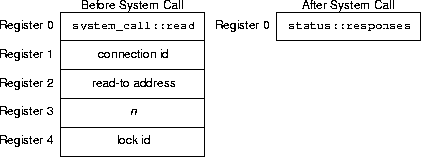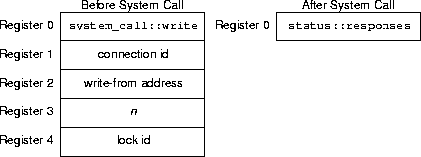system_call::open)device::disk and device::terminal. The status of the open system
call is returned in CPU register 0; the possible status codes are

After the open system call is completed, CPU register 0 contains the system call status:
status::ok | command completed successfully |
status::device_busy | requested device has already been allocated |
status::bad_device | the value d in CPU register 1 is not device::disk
or device::terminal |
If the open system call completed successfully, CPU register 1 contains a connection identifier, which must be included as an argument to other system calls related to this device. If the open system call didn't complete successfully, the contents of CPU register 1 is undefined.
system_call::close)
After the close system call is completed, CPU register 0 contains the system call status:
status::ok | command completed successfully |
status::bad_device | the connection id in CPU register 1 is not associated with any device |
If the close system command completes successfully, the connection id held by the user process becomes invalid and may not usefully be used in any other system call.
system_call::read)
After the read system call is completed, CPU register 0 contains system call status:
status::ok | command completed successfully |
status::bad_address | the Primary Store address in CPU register 2 is bad |
status::bad_count | the contents of CPU register 3 is bad |
status::bad_device | the connection id in CPU register 1 is not associated with any device |
status::bad_id | the number in register 4 is not a valid lock id |
At the end of a successful read (register 0 contains status::ok), the
operating system will unlock the lock associated with the lock-id passed in as
an argument. If the system call fails (register 0 does not contain
status::ok), the lock is not changed.
At the end of a successful terminal read, the word at the read-to address (the contents of register 2 at the time of the read system call) contains the number of characters read from the terminal; the characters read appear, one per word, in the subsequent words. The number of characters actually read from the terminal may be smaller (never larger) than the number of characters requested if the terminal sends an end-of-file character during the read. Once a terminal receives the eof-character, it will always read 0 characters.
system_call::write)
After the write system call is completed, CPU register 0 contains the system call status:
status::ok | command completed successfully |
status::bad_address | the Primary Store address in CPU register 2 is bad |
status::bad_count | the contents of CPU register 3 is bad |
status::bad_device | the connection id in CPU register 1 is not associated with any device |
status::bad_id | the number in register 4 is not a valid lock id |
At the end of a successful write (register 0 contains status::ok), the
operating system will unlock the lock associated with the lock-id passed in as
an argument. If the system call fails (register 0 does not contain
status::ok), the lock is not changed.